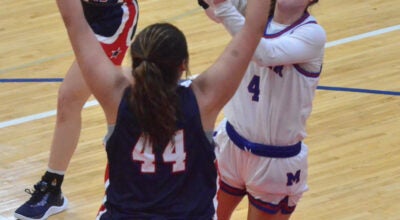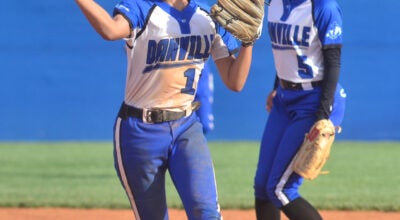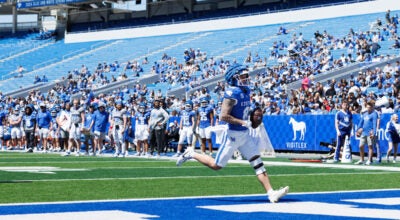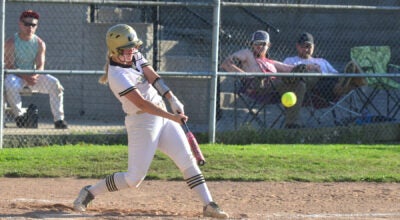Legendary Boyle baseball teams featured in documentary
Published 1:55 pm Thursday, September 2, 2021
For every team that went all the way, there are several more that might have been good enough but couldn’t quite get there.
We remember the winners, but the stories of the truly great teams that came up short often are lost to history. The story of one local baseball program, however, and its impressive three-year run nearly 50 years ago will live on through a documentary that preserves the stories of the players and coaches who were there.
The Boyle County baseball teams of 1973-75 are the subject of a film by the Sports History Foundation that details the Rebels’ successes and failures and the enduring friendships that resulted from them.
“Treasures of Black and Gold” was screened for the public for the first time Saturday at the Boyle County Performing Arts Center, bringing to light a story that might otherwise exist only in yellowed newspaper clippings, old scorebooks and the stories told among teammates
Some of the players and coaches had attended a private screening a couple of months ago, but on Saturday they were joined by family members and others who hadn’t seen the film.
“It humbles me beyond belief,” said Tom Hollon, Boyle’s catcher during that period.
Boyle went 76-8 over the three seasons that are the focus of the documentary, a record that included a 40-game regular-season winning streak over two seasons. It was one of the most successful runs for any Boyle athletic team in the early years of the school, which opened in 1963.
Players and coaches said in the film they believed they had one of the best teams in the state and could have won multiple state championships during that run, but the fickle nature of single-elimination postseason baseball wasn’t kind to the Rebels.
They reached the state tournament only once, in 1974, and they lost their only game there. They lost regional championship games to schools from Lexington in 1973 and ’75.
The Sports History Foundation, which was founded in 2013, has made several documentaries focusing on significant teams or moments in Kentucky high school sports history. Executive director David Mills said this story was a bit different from the others.
“What was so important about this particular story is because there’s so many (teams) that you don’t know of and that you don’t hear that were so close to winning a championship, to winning two championships, to winning something that everyone strives for,” Mills said. “Think of all those teams that fell short, and after the year’s over all you remember is the team that won it.
“But what about the teams that didn’t quite get there? So that’s what made this story so interesting. The closeness of the team was what was remembered in the later years. They didn’t win that championship, so it was the close-knit family that they were able to have over that time period. It was a good story to tell.”
The filmmakers used interviews, stories and photographs from the Advocate and other newspapers and photos from other sources to tell the Boyle teams’ story.
“I loved it. It’s amazing to be able to put all this together and give recognition to that team, to those years,” said Bob Gorley, who coached those teams and who saw the film for the first time Saturday. “It’s special, and I’m part of history.”
Gorley, who was on the Boyle baseball coaching staff for 11 seasons and was head coach from 1969-75, said he liked that the film spotlighted the strong bond that existed among those teams.
“You got to see the personal side of the players and the really heartfelt friendships that developed among those teammates,” he said.
Both in the film and in interviews after the screening, players and coaches alike said those friendships have only grown stronger over time.
The Rebels fielded some pretty strong teams in those years, too. Known for a sound lineup, pitching depth and an aggressive style of play, they enjoyed remarkable success — even if it wasn’t as much as they wanted.
The 1973 Boyle team went 26-2, losing only to eventual state champion Henry Clay in the Central Kentucky Conference championship and again in the regional final.
In 1974, the Rebels took a 25-3 record to their first trip to the state tournament after defeating a powerful Tates Creek team 4-1 for the program’s first regional title. At the state tournament in Morehead, they lost a first-round game to Paducah Tilghman, the eventual runner-up, 1-0.
In 1975, they finished 25-3 after Tates Creek defeated them in the regional final to deny them a second straight trip to state. Tates Creek went on to the state semifinals.
“I thought I had the best team and I didn’t win, so I feel bad about that,” Gorley said. “Supposedly that (1975) Tates Creek team that beat us in the finals of the region was the best team the state had ever seen at the time.
“We always had such an empty feeling, especially that one year, ’74. But that’s OK; it’s happened to a lot of other teams, too.”
Third baseman Joe Beldon said he and his teammates were convinced they had the best team in the state during that three-year stretch.
“We didn’t get the ultimate goal, but that doesn’t make you look back and think you weren’t still the best team,” Beldon said.
Another player, Mike Brummett, said the Boyle teams accomplished a great deal even though they didn’t get the title shot they wanted.
“We accomplished something to be proud of, and we’ll be hopefully kept in the history books down the road,” Brummett said. “I think there’ll be teams that will be as good as we are, maybe better, and maybe there already have been, but it’s just very important for me.”
The film examines how the team came together, from blending players who were on different teams in a successful Little League program to putting aside individual glory to work toward a common goal at the high school level.
“I don’t remember the 40-game win streak. I had no clue about that,” Brummett said. “I remember that it wasn’t significant to us, because all we cared about was going out and laying and having fun. We enjoyed playing with each other.”
“And we didn’t care who did what as long as we won. There weren’t any egos that I remember,” Hollon added. “We were just glad we won, and we were all one, and today we’re brothers.”
It details each of the three spotlighted seasons, spending time on the 1974 regional final and the state tournament game, as well as the regional losses in 1973 and ’75.
It also devotes several minutes to a profile of brothers Paul and Mike Orberson, who are among the members of the team who have passed away.
“I know it means a lot to everyone involved, and we sure miss those people that weren’t here and those that are no longer with us,” Gorley said.
Those who were part of it said it is a wonderful legacy for their children and grandchildren.
“I think it’s special for our grandkids, even our great-grandkids,” Brummett said.
“It really humbles me,” Beldon added. “My son Joey didn’t know anything about this stuff, even when he was playing. We never talked about me playing baseball because he’s his own man, but he got a big kick out of it today. That kind of stuff, it just brings the humility out in you.”
Mills said he was humbled by hearing players talk about how the film touched them and brought back memories.
“They get to tell their story on screen, but then they get to hear what the other people said, and it just brings back those memories,” he said.
“It was a great story, and we wanted to cover it and have something that would last for a long time.”
* * *
“Treasures of Black and Gold” is available through the Sports History Foundation. DVDs and Blu-ray Discs are available, as are annual memberships that allow online access to all of the foundation’s documentaries.
Visit sportshistoryfoundation.org for more information.
Visit www.youtube.com/watch?v=Esd0VxzFcR0 to watch a trailer for “Treasures of Black and Gold.”






